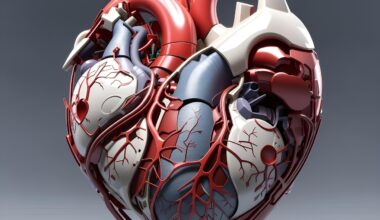How to Listen to Your Body’s Rest Needs Post-Workout
Post-workout nutrition is vital, contributing to recovery, growth, and overall fitness. However, it’s equally crucial to prioritize rest to maximize your gains. Exercise leads to muscle micro-tears, and without sufficient rest, recovery gets hampered. Sleep is a fundamental component, allowing the body to repair itself more effectively. Listening to your body when it signals fatigue helps optimize your performance in workouts. By integrating rest days into your training schedules, you can prevent overtraining syndromes, such as burnout and injuries. During intense training phases, the body requires extra time to recuperate, which is why clients often neglect rest. To promote effective recovery, consider including both passive and active strategies in your routine. Methods can include foam rolling, hydration, proper sleep, and balanced meals. Nutrition should focus on proteins and carbohydrates, which support muscle recovery. Additionally, antioxidants found in fruits and vegetables can help combat inflammation. Overall, remember that both nutrition and rest are essential; neither should be overlooked. By prioritizing these aspects, you enhance your post-workout recovery and prepare your body for future challenges.
Monitoring readiness is a critical part of balancing training and recovery. After intense workouts, checking in with yourself can provide essential insights into your body’s requirements. You might experience minor aches or general fatigue, both of which are indicators for adequate rest. Utilizing tools such as heart rate variability and sleep quality apps can be beneficial. These apps allow you to track how well you’re resting and recovering. If measurements indicate fatigue, consider adjusting your workout schedule. In some cases, short sessions or lighter workouts may suffice. Furthermore, don’t underestimate the importance of variety in your training regime. Mixing up high-intensity workouts with lower-intensity activities facilitates improved recovery. This approach not only boosts your physical health but also helps maintain motivation and avoids burnout. Listen carefully to what your body requires, including the need for lighter workout days and structured rest days. Consistent attention to your body ensures that you stay aligned with your fitness goals. Overall, adopting a holistic approach that respects your body’s needs leads to successful training outcomes and reduces the risk of injuries.
The Role of Nutrition in Recovery
Incorporating the right nutrition during recovery enhances not only your health but also your performance. Nutritional choices made after workouts largely determine how effective your recovery will be. Aim for a balanced intake of macronutrients during post-workout meals or snacks that adequately replenish your body’s energy stores and supports muscle repair. Protein sources, such as chicken, fish, and legumes, play a key role in muscle recovery by supplying essential amino acids. Carbohydrates are equally important, as they replenish glycogen stores depleted during workouts. Healthy fats are also beneficial; including sources like avocados, nuts, and seeds can promote inflammation reduction. Furthermore, hydration is a crucial component of post-workout nutrition. Water or electrolyte-rich beverages can significantly aid your recovery process. Keeping fluid intake high enables better circulation of nutrients throughout the body. By advocating for a balanced meal plan that complements your recovery needs, you can enhance both physical performance and mental well-being. Aim to consume a recovery meal or snack that appropriately refuels and supports your recovery journey while being mindful of portion sizes.
The psychological aspect of rest is an often overlooked component in physical fitness. Many individuals ignore rest, driven by the fear of losing gains or falling behind. This mindset can lead to chronic fatigue and burnout. It’s essential to adopt an attitude that embraces rest as a crucial part of your fitness journey. Acknowledging that physical training goes hand-in-hand with adequate recovery is significant in fostering a sustainable routine. Concentrating on mental well-being can also reduce anxiety about rest. Engaging in activities that promote relaxation, such as gentle yoga or meditation, can encourage a mindset shift. Moreover, incorporating hobbies or socializing encourages a fuller recovery time. By exploring different activities that bring joy, you can forget about the competitive pressures of fitness, which is vital for mental health. Remember, rest doesn’t mean inactivity; it is an opportunity to recharge your body for future sessions. Prioritizing rest into your fitness plan cultivates resilience and an overall healthier approach to exercise. In turn, a strong mental framework supports your physical goals and ensures longevity in your fitness journey.
Signs that You Need More Rest
Identifying when you require a break or additional rest can significantly improve your training outcomes. Common symptoms may include increased muscle soreness, fatigue, lack of motivation, and difficulty concentrating. It’s crucial to pay attention to these cues from your body and respond accordingly. If workouts start feeling excessively challenging or your usual enthusiasm fades, consider reassessing your recovery strategies. Additional signs may manifest in your sleep patterns, with issues such as insomnia or disrupted sleep directly affecting your performance and recovery. Furthermore, monitor your resting heart rate to gauge your fatigue level. A consistently higher rate can indicate a need for extended rest. There are also psychological factors to consider; feelings of irritability or mood swings could point to overtraining. Intrinsic motivation may also wane when the body is overworked. Listening closely to these physical and emotional signals can help enhance your productivity. By recognizing the need for rest, individuals can implement timely adjustments to training routines. Utilize this awareness to positively impact performance while ensuring wellness and preventing injuries over time.
Establishing a balanced training routine is essential to ensuring productivity and fitness progress. This balance involves alternating between high-intensity workouts and adequate rest days. Implementing recovery techniques post-workout may facilitate improved performance in subsequent sessions. Among these techniques are dynamic stretches and cooling down exercises that enhance flexibility and relaxation. Additionally, micro-level strategies such as investing in a good mattress can promote more profound, restorative sleep. Utilizing sleep supplements, like certain vitamins or minerals, may positively influence your recovery. Furthermore, consider incorporating more movement during rest days, such as engaging in leisurely walks or gentle cycling. Active recovery days can significantly aid in muscle rejuvenation and blood circulation. Likewise, recovery packs can enhance comfort during designated rest times. These packs may include nutritious snacks and hydration options, making it easier to focus on recovery needs. Balancing your workout intensity with purposeful rest keeps momentum moving forward without compromising recovery. Invest time in understanding your body through these interventions to cultivate optimal health and fitness progress.
Conclusion: Embracing Holistic Recovery
The importance of both nutrition and rest in the post-workout phase cannot be overstated. Cultivating a holistic recovery plan is crucial to achieving ongoing fitness objectives. Returning to the idea that rest promotes recovery, staying in tune with your body ensures you’re recognizing physical signals for recovery needs. This balanced approach can also involve seeking support from fitness professionals or nutritionists who can provide tailored guidance. They may help develop personalized dietary plans or relaxation techniques to support your overall fitness journey. Furthermore, interlinking physical and mental recovery generates a comprehensive strategy for well-being. Avoiding injuries while enhancing performance is a continual process that often translates into steady progress. Over time, individuals should recognize the long-term benefits of ensuring ample recovery, both psychologically and physically. Bolstering the significance of rest and nutrition offers an integrative framework for consistent training success. In sum, embrace all aspects of recovery to achieve balanced health and performance in your fitness journey. Initialize this mindset shift and see a transformative impact on your overall well-being.
This is another paragraph with exactly 190 words…





